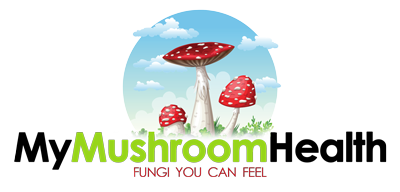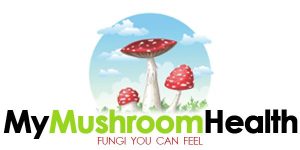Learn About Mushrooms
Research examining the health effects of mushrooms has identified approximately 130 possible therapeutic properties, including but not limited to the following:
- Anti-bacterial
- Anti-inflammatory
- Anti-fungal
- Antioxidant
- Anti-diabetic
- Anti-parasitic
- Anti-tumor
- Anti-viral
- Hepatoprotective
- Immunomodulating (21)
To date, much of the research that has been done on medicinal mushrooms is based on animal or in-vitro trials. However, some early clinical trials suggest that mushroom intake may reduce the risk of breast cancer, (4) and may improve cancer-related symptoms, such as insomnia and night sweating. (14) Several mechanisms have been proposed to explain the beneficial effects of mushrooms for immune health. Certain mushrooms may positively influence the gut microbes, improving protection against pathogens. (10) Additionally, several mushrooms have been shown to support immune health by enhancing the innate and adaptive immune responses. (21) Conversely, certain mushroom extracts may also suppress the immune response, thereby exerting anti-allergic effects. (14)
TOP FIVE MUSHROOMS FOR IMMUNE SUPPORT
1. Chaga (Inonotus obliquus)
Chaga mushroom, also referred to as birch mushroom, is a dark brown and black fungus that grows most often on birch trees. Several compounds found in Chaga may result in its beneficial effects, including anti-oxidant polyphenols, as well as betulin and betulinic acid, which are associated with anti-cancer effects. (6)
2. Cordyceps (Ophiocordyceps sinensis)
Technically not a mushroom, Cordyceps are rare caterpillar fungus that grows only in high-altitude regions of Sikkim, a state in northeast India. (14)(18) The bioactive components in Cordyceps include polysaccharides, cordycepin, and cordycepic acid. An eight-week study in healthy Korean individuals found that supplementation with cordyceps extract was associated with increased activity of natural killer immune cells (NK-cells). This change was accompanied by improved immune regulation compared to controls. (12)
3. Lion’s Mane (Hericium erinaceus)
Hericium erinaceus is commonly known as lion’s mane mushroom due to its white, fur-like appearance. Animal testing on mammals have demonstrated that Lion’s Mane may promote beneficial gut microbial growth and be associated with reduced colon tissue damage in cases of inflammatory bowel disease (IBD). The researchers suggest that lion’s mane may help regulate the immune system and improve the health of individuals with IBD, however, clinical trials are needed to confirm this in humans. (2)
4. Reishi (Ganoderma lingzhi)
Reishi is commonly referred to as the “king of mushrooms” (5) or the “mushroom of immortality”. (20) It has been shown to prevent or treat various diseases (20) and modulate the inflammation associated with a high-cholesterol diet. (5) The health effects of this mushroom may be a result of its ability to regulate microbiota composition, as the polysaccharides found in Reishi demonstrate prebiotic effects and may increase counts of beneficial bacteria in the host. (5)
5. Turkey Tail (Coriolus versicolor)
The turkey tail mushroom obtains its name from the tan and brown rings on its surface, similar in appearance to the tail feathers of a turkey. (19) In traditional medicine, turkey tail has been used therapeutically for fungal infections, cancer, and acquired immunodeficiency syndrome (AIDS). (10) Contemporary research in animal models of breast cancer suggests that C. versicolor exerts an anti-tumor and anti-metastasis effect, indicating that it may reduce the risk of developing secondary cancerous growths. Polysaccharide-K (PSK), a proprietary formulation of turkey tail, is approved in Japan as a complementary cancer treatment. (19) A 2007 meta-analysis of over 8,000 patients conducted by the Kyoto University Graduate School of Medicine in Japan found that PSK in combination with chemotherapy increased the survival rate of patients following gastric cancer resection. (17)
BENEFITS
Reishi, Turkey Tail, Lions Mane, Chaga and Cordyceps among others are all filled with micro-nutrients that help support a balanced healthy system. Below is a list of the many benefits known to date.
A. Packed with Antioxidants
Antioxidants are compounds that help inhibit or reduce damage caused by oxidative stress. Oxidative stress results from to many free radicals. This can result in cellular damage and chronic inflammation (1Trusted Source). This imbalance has also been linked to an increased risk of developing other health conditions, such as certain cancers and heart disease (2Trusted Source, 3Trusted Source). When you consume foods rich in antioxidants or you begin to supplement with these powerful compounds you can benefit by reduced oxidative stress and inflammation on your cells. Turkey tail contains a wide range of antioxidants, including phenols and flavonoids (4Trusted Source). In fact, one study detected over 35 different phenolic compounds in a sample of turkey tail mushroom extract, along with the flavonoid antioxidants quercetin and baicalein (5Trusted Source). Phenol and flavonoid antioxidants promote immune system health by reducing inflammation and stimulating the release of protective compounds (6Trusted Source). For example, quercetin has been shown to promote the release of immuno-protective proteins like interferon-y, while inhibiting the release of the pro-inflammatory enzymes cyclooxygenase (COX) and lipoxygenase (LOX) (7Trusted Source).
B. Contains Immune-Boosting Polysaccharopeptides
Polysaccharopeptides are protein-bound polysaccharides (or carbohydrates) that are found in Turkey Tail. Polysaccharide Peptide (PSP) is a type of polysaccharopeptides found in turkey tails (8Trusted Source). PSP possess powerful immune-boosting properties and assists with immune response by activating and inhibiting specific types of immune cells and which help to suppress inflammation. For instance, test-tube studies have demonstrated that PSP increases monocytes, which are types of white blood cells that fight infection and boost immunity (9Trusted Source). Due to their ability to naturally strengthen the immune system, PSP are commonly used as anticancer agents in conjunction with surgery, chemotherapy and/or radiation in countries like Japan and China (11Trusted Source).
C. May improve immune function in people with Cancer
Research has demonstrated that turkey tail mushrooms may have antitumor properties, thought to be related to its immune-boosting effects. One test-tube study found that PSK, another polysaccharopeptide found in turkey tail mushrooms, inhibited the growth and spread of human colon cancer cells (12Trusted Source). What’s more, a certain type of polysaccharide found in turkey tail mushrooms called Coriolus versicolor glucan (CVG) may suppress certain tumors. A study in tumor-bearing mice found that treatment with 45.5 and 90.9 mg per pound (100 and 200 mg per kg) of body weight of CVG extracted from turkey tail mushrooms daily significantly reduced tumor size (13Trusted Source). Researchers attributed this development to enhanced immune response (13Trusted Source). Another study demonstrated that daily treatment with 45.5 mg per pound (100 mg per kg) of body weight of turkey tail mushroom extract significantly slowed the spread of cancer cells and improved survival times in dogs with highly aggressive cancer (hemangiosarcoma) (14Trusted Source). These studies are very useful, but the most impressive evidence regarding the anticancer benefits of turkey tail mushroom is when it’s used in combination with more traditional treatments, such as chemotherapy and radiation (15Trusted Source, 16Trusted Source, 17Trusted Source).
D. May Enhance the benefits of Common Cancer Treatments
Due to the many beneficial compounds it contains, turkey tail is commonly used in tandem with traditional treatments like chemotherapy as a natural way to fight certain cancers. A review of 13 studies found that patients given 1–3.6 grams of turkey tail mushroom per day along with conventional treatment had a significant survival advantage. The study showed that people with breast cancer, gastric cancer or colorectal cancer treated with turkey tail and chemotherapy experienced a 9% reduction in 5-year mortality compared to chemotherapy alone (15Trusted Source). Another review of 8 studies in over 8,000 people with stomach cancers demonstrated that those who were given chemotherapy along with PSK lived longer after surgery than individuals given chemotherapy without PSK (16Trusted Source). A study in 11 women with breast cancer found that those who were given 6–9 grams of turkey tail powder per day following radiation therapy experienced an increase in cancer-fighting cells in the immune system, such as natural killer cells and lymphocytes (17Trusted Source).
E. May Enhance Gut Health
Keeping a healthy balance of beneficial bacteria in your gut is critical for maintaining a strong immune system.
Your gut and brain are linked through the Vagus Nerve and your gut bacteria also interacts with immune cells and directly impact your immune response (18Trusted Source).
Turkey tail contains prebiotics, which help nourish these helpful bacteria. An 8-week study in 24 healthy people found that consuming 3,600 mg of PSP extracted from turkey tail mushrooms per day led to beneficial changes in gut bacteria and suppressed the growth of the possibly problematic E. coli and Shigella bacteria (19Trusted Source).
A test-tube study found that turkey tail extract modified gut bacteria composition by increasing populations of beneficial bacteria like Bifidobacterium and Lactobacillus while reducing potentially harmful bacteria, such as Clostridium and Staphylococcus (20Trusted Source).

